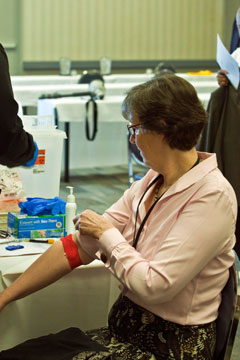Bishop Nkulu Ntanda Ntambo of the Democratic Republic of Congo sat down in front of a health care worker and extended his left arm forward.
Less than two minutes later, his blood had been drawn and he was finished being tested for HIV/AIDS.
Just that simple.
That is the witness Ntambo and scores of other United Methodist leaders shared with the world May 3 as they went through HIV/AIDS testing on the first full day of the spring meeting of the Council of Bishops. More than 130 people were tested.
"It's a mission," Ntambo said after being tested. "It's saving lives."
The bishops and some of their spouses lined up in small groups throughout the morning for the testing administered by Columbus-based OhioHealth. The testing was a visible commitment to a major issue of global health, one of the four areas of focus in The United Methodist Church.
In welcoming church leaders to participate, Ohio West Area Bishop Bruce Ough said the action makes a public statement "that combating this deadly disease begins with testing."
After his test, Seattle Area Bishop Grant Hagiya said the public testing also was a "symbol of not being afraid to be tested, how easy it is."
Several bishops said it also was important for church leaders to demonstrate their solidarity with people facing the issue of HIV/AIDS.
"This is a way of saying we understand where the world is, and to be with those who are suffering," said Charlotte (N.C.) Area Bishop Larry Goodpaster, president-elect of the council.
'Marvelous witness'
San Francisco Area Bishop Warner Brown said Jesus used healing as part of his ministry of compassion and engagement with people.
In being tested for HIV, he said, the bishops created an entry point for ministry "by showing our compassion, our caring, our intervention."
The ministry was mutual. Before they left the testing rooms, each bishop was given a small, yellow prayer banner with a reflection from someone who either has or knows someone who has the disease. The banners contained signed messages with entreaties such as "Welcome us in" and "Don't give up on us."
Lyn Ellis of the Broad Street United Methodist Church AIDS Outreach Committee in Columbus smiled as she handed out banners.
"I think this is a marvelous witness. This is something a lot of people should do, could do," she said. "This kind of takes the fear out of it."
A stand against fear
Illinois Area Bishop Gregory Palmer, president of the Council of Bishops, said the bishops were inviting people out of the shadows of fear surrounding HIV/AIDS by having themselves tested. "This is wise. It's smart. It's safe to do."
More than a public health witness, it also was an act of love, said Betty Wandabula of Kampala, Uganda, the wife of East Africa Area Bishop Daniel Wandabula.
"Christ would want me to be here today," she said.
Even if people discover they have the disease, she said, the church will stand with them.
"Christ loves them with or without the disease."
*Briggs is news editor of United Methodist News Service.
News media contact: David Briggs, Nashville, Tenn., (615) 742-5470 or [email protected].
Like what you're reading? Support the ministry of UM News! Your support ensures the latest denominational news, dynamic stories and informative articles will continue to connect our global community. Make a tax-deductible donation at ResourceUMC.org/GiveUMCom.





